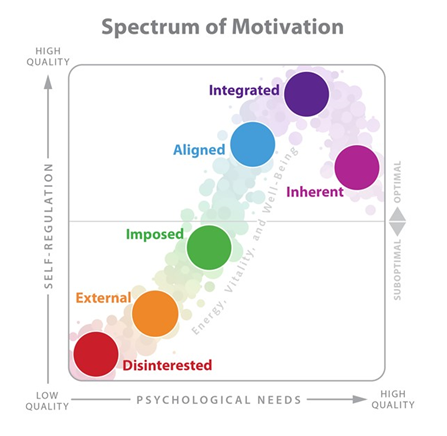 Why Motivating People Does’t Work and What Does: The New Science of Leading, Energizing and Engaging by Susan Fowler
Why Motivating People Does’t Work and What Does: The New Science of Leading, Energizing and Engaging by Susan Fowler
My rating: 4 of 5 stars
In the book it states that everyone is motivated all of the time, as such it is not possible and there is no need to motivate people. The challenge is more to get people excited to work on the things which are important for the company or organisation. It presents the motivation spectrum which shows a desire for high quality self-regulation and physiological needs.

The three physiological needs : Autonomy, Relatedness and Competence.
Autonomy : our human need to perceive we have choices. It is our need to feel that what we are doing is of our own power. It is our perception that we are the source of our actions.
Relatedness : our need to care about and be cared about by others. It is our need to feel connected to others without concerns about ulterior motives. It is our need to feel that we are contributing to something greater than ourselves.
Competence : our need to feel effective at meeting everyday challenges and opportunities. It is demonstrating skill over time. It is feeling a sense of growth and flourishing.
The three self-regulation needs : Mindfully managing feelings & thoughts, Values and Purpose for immediate and sustained positive effort.
Mindfulness : noticing – being aware and attuned to what is happening in the present moment without judgment or an automatic reaction. It is a state of being but is also a skill that requires development through practice and patience.
Values : premeditated, cognitive standards if what a person considers good or bad, worse, better or best. Values are enduring beliefs a person has chosen to accept as guidelines for how (s)he works and lives his life.
Purpose : a deep and meaningful reason for doing something. Purpose is acting with a noble intention – when your actions are infused with social significance.
To be able to support a shift in motivation there needs to be an improvement in physiological (ARC) and self-regulation needs (MVP). It is very important not to problem solve but to really deeply understand where someone is currently and to help them, as an individual, work towards a shift. You can use techniques such as five whys to dig into where someone is currently. Imposing your values or telling people what to do will not improve the individuals motivation.